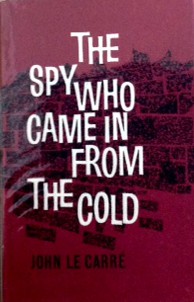Inspiring Older Readers
 posted on 18 Jun 2016
posted on 18 Jun 2016
The Spy Who Came In From The Cold by John Le Carré
I remember quite clearly the first time I read this book when I was at university in Bangor, North Wales in the 1970’s. Winters in Bangor were no fun ( I suspect that might still be true) and each day left you with a feeling of hanging grey gloom that seeped it’s way not just into your bones but into your psyche. However, the atmosphere of Le Carré’s masterpiece made North Wales seem, by comparison, positively Mediterranean.
Set in the 1950s during some of the most febrile years of the Cold War, Le Carré’s novel of triple-cross espionage takes place in a world in which barely a decade has passed following the war that ripped the world apart. In Britain rationing didn’t end until 1954 and the youth-led cultural explosion of the 1960s must have seemed a million miles away – the world at this time seemed drained of its vitality and the only colours that characterised public life were shades of grey.
Alec Leamas is the spy at the heart of this novel - a veteran of the war and a man who gives the impression that his time in the secret services has led him to see and experience more than any decent person should. From the outset, this is a man at the end of something, a man with doubts so deeply entrenched that they are existential. So, when he is offered the chance to go under deep cover to infiltrate the East German secret service and incriminate one of their master-spies, he sees no reason not to do it.
Leamas is set up to ‘defect’ and in order to make this convincing he embraces a brand of method-acting that is so extreme that his degradation takes him to prison, through debilitating illness and into a dead-end job. Significantly, he also falls into an ambiguous and confused relationship with a young woman, Liz, who has recently become a member of the Communist Party of Great Britain. His subterfuge seems to have been successful when he is eventually contacted by representatives of the East German secret service and finds himself taken away for debriefing.
What follows is an extensive exploration of the political and human condition. Deceit is ingrained into every action and every thought. No-one involved in this is in control – their every act, it turns out, is being guided by remote puppet masters who have their own script which they have no intension of sharing with the people they manipulate. Ultimately their loss and their death is simple collateral damage in a much bigger game.
The one innocent person in the escapade is Liz and it’s through her that Leamas comes to the realisation of what is happening to him and what he has become. When it becomes clear that Liz was unwittingly an integral part of setting up the triple- cross, Leamus knows he must try and save her – at whatever cost to himself – and prevent her from being an incidental sacrifice. At the end of the novel Leamus can escape – come in from the cold – should he choose; he can cross the Berlin Wall even if Liz is to be sacrificed there but he chooses not to. In the end his notion of coming in from the cold is quite different from those pulling his strings: if he is to return from the cold, dark hinterland of his soul he must become concerned once more for humanity and for human values. He could ‘escape’ but he can’t escape the demands of his soul.
This is a really fabulous novel and has, in many ways, determined how we think about spies, espionage and the Cold War. But it is, in fact, a book that’s less about the realpolitik of the 1950s and much more about politics of the soul and how easily we can lose our sense of what it really means to be human.
Terry Potter
June 2016